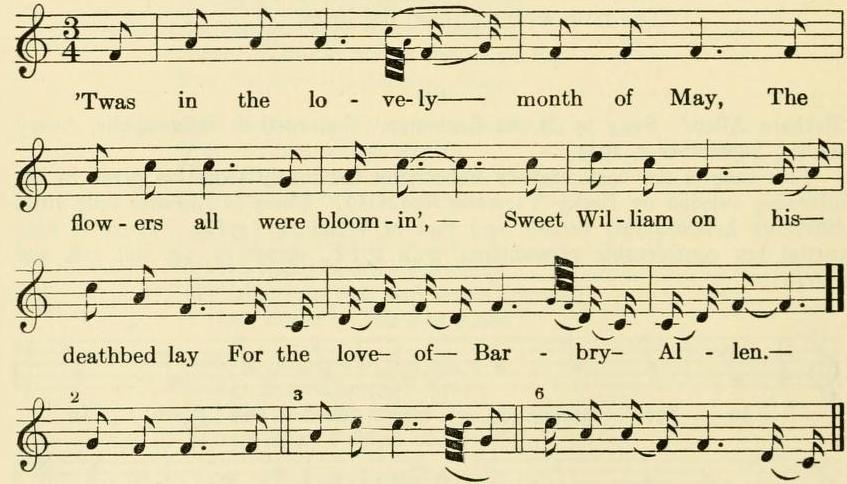Barbara Allen (Barbry Allen)- Tarwater (TN) 1936 Seeger REC/ Brown HH
[From LOC recording 1936, by Charles Seeger. His notes follow. Tarwater was also recorded by the Brown collection as version HH (see bottom of this page).
R. Matteson 2012]
A4-BARBARA ALLEN. Sung by Rebecca Tarwater 01 Rockwood, Tennessee. Recorded in Washington, D.C., 1936, by Charles Seeger.
For two hundred years "Barbara Allen" has been the best loved of all English ballads. It encompasses both of the ideas which are commonest in British and American ballads of love, i.e., that love leads to death, and that a proud lover always destroys himself and his loved one. The air of the ballad always seems fresh and tender, no matter how often one hears it, and the verses paint a picture that has all the soft cruelty of spring. Only last summer a Georgia mountain farmer told me, "Every time I hear 'Barbara Allen' it makes the hair rise on my head." Rebecca Tarwater, the singer, although she has had some voice training, gives us the melody as it was sung to her by her mother. The text is extremely short-six stanzas in place of the usual ten to fifteen. Child No. 84. For reference material on this ballad see pages 60 ff. of Belden, Ballads and Songs.
[Listen: Rebecca Tarwater] Recording has first verse only
1. 'Twas in the lovely month of May,
The flowers all were bloomin';
Sweet William on his death-bed lay
For the love of Barbry Allen.
2. He sent his servant to her door,
He sent him to her dwellin':
"My master's sick and he calls for you,
If your name be Barbry Allen."
3. Then slowlye, slowlye, got she up,
And to his bedside goin':
"My master's sick and he called for you,
If your name be Barbry Allen." [1]
4. He turned his pale face to the wall,
And bursted out a-cryin':
"Adieu, adieu to all below,
And adieu to Barbry Allen!"
5. Sweet William died on a Saturday night,
And Barbry died a Sunday.
Their parents died for the love of the two;
They was buried on a Easter Monday.
6. A white rose grew on William's grave,
A red rose grew on Barbry's;
They twined and they twined in a true-lover's knot,
A-warnin' young people to marry.
Footnote:
1. The singer mistakenly repeats these lines from Stanza 2. They usually are sung:
"No better, no better, you will ever be,
For you can't have Barbry Allen."'
_________________________________________
HH. 'Barb'ry Allen.' Sung by Becky Tarwater. Recorded in August 1939, 1940, or 1941. No place given. This tune is a perfect example of the intuitive art of variation which the true folk singer has as his native endowment. Actually this version is only a variation of the Buchanan version (27GG), but what a difference that makes.

For melodic relationship cf. **SharpK i 185, No. 27C for basic melodic outline; also SFSEA 150, No. 131. Scale: Mode III, plagal (4,4). Tonal Center: f. Structure: abcb1 (2,2,2,2) = ab
2 He sent his servant to her door,
He sent him to her dwellin'.
'My master's sick and he calls for you
If your name be Barb'ry Allen.'
3. Then slower, slower got she up
Unto his bedside going.
My master's sick and he calls for you
If your name be Barb'ry Allen.
4. He turned his pale face to the wall
And bursted out a-cryin',
'Adieu, adieu to all beloved,
Adieu to Barb'ry Allen.'
5. Sweet William died on Saturday night
And Barb'ry died that Sunday.
Their parents died for the love of the two,
They was buried on a Easter Monday.
6. A white rose grew on William's grave,
A red rose grew on top of it.
They climbed and they climbed in a true lover's knot
A-warning young people to marry.